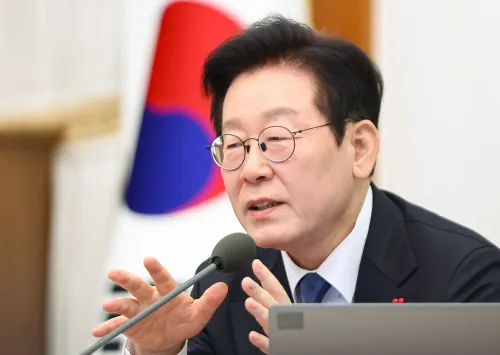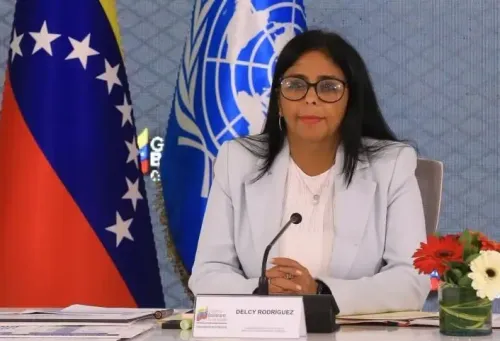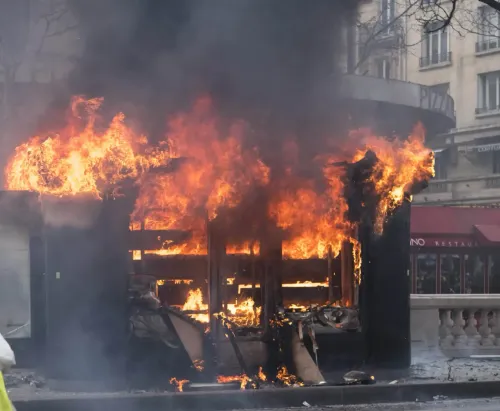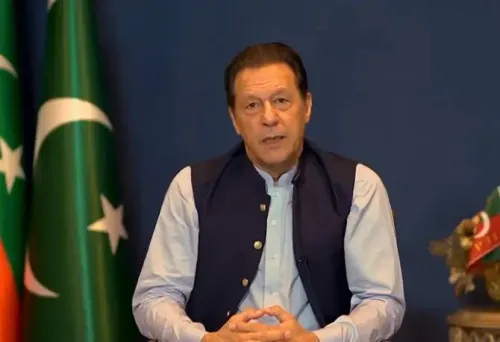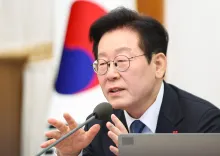Is the NCP Setting Preconditions for the February Election Amidst Growing Insecurity in Bangladesh?

Synopsis
Key Takeaways
- The NCP is unwilling to participate in elections without securing total immunity for past actions.
- Public support for the NCP remains low, raising questions about its viability.
- Controversies surrounding leadership and internal conflicts threaten the party’s credibility.
- Potential alliances with other political factions may alter the electoral dynamics.
- The interim government’s bias towards the NCP could impact the overall political climate.
Dhaka, Nov 4 (NationPress) As Bangladesh prepares for its national election in February 2026, the National Citizen Party (NCP) has shown reluctance to participate unless it can secure total immunity for its actions during last year’s July uprising. The behavior and statements from NCP leaders reveal a growing sense of insecurity within the party’s political maneuvering.
Their persistent calls for electoral reform — advocating for national elections to be conducted based on proportional representation (a stance shared by Islamist factions) — signal their recognition of dwindling public support.
The initial enthusiasm following the July Uprising has diminished, as evidenced by the escalating political turmoil that ensued after the ousting of former Prime Minister Sheikh Hasina, exposing a significant deficit in the nation’s democratic framework.
With the Bangladesh Election Commission (EC) denying the NCP the ‘shapla’ symbol, the party’s morale has taken a hit, leading members to threaten a postponement of the elections if they are not granted their electoral symbol. The NCP is now considering alliances with both the Bangladesh Nationalist Party (BNP) and the radical Islamist group Jamaat-e-Islami, despite previously engaging in heated exchanges with both, as it attempts to position itself as a ‘new’ alternative for Bangladesh. The NCP’s so-called ‘revolutionary’ rise appears to be fleeting and may be approaching its conclusion.
In the wake of Hasina’s removal and the political isolation of the Awami League — Bangladesh's largest political entity — the country has witnessed two significant developments: a resurgence of Islamist factions and an increasing rift between former allies, the BNP and Jamaat.
Last September, a new political entity called the Jatiyo Nagorik Committee (National Student Committee) was formed by notable student leaders of the July Uprising, aiming to replace the ‘current fascist political settlement’ with a democratic framework and to act as the ideological leader of the July Uprising.
The committee believes that the establishment of a new political party is essential to realize the aspirations of the July Uprising. This led to the formation of the student-driven political party — Jatiyo Nagorik Party (National Citizen Party) — which was officially announced on February 28, 2025, with a centrist and pluralistic ideology, aspiring to create a ‘second republic’ in Bangladesh and intending to compete for all 300 seats in the national (Jatiya Sangsad) elections.
Within just six months, 32 leaders from the NCP resigned, citing internal conflicts, misconduct, and dissatisfaction with leadership. Additionally, the NCP’s student faction — Bangladesh Gonotantrik Chhatra Sangsad (BGCS) — faced significant defeats in recent student union elections at Dhaka, Jahangirnagar, Chattogram, and Rajshahi University. Voter preference surveys conducted this year have reflected similar unfavorable trends.
An Innovision Consulting survey conducted in March indicated that despite some appeal among young voters, overall support for the NCP stands at just five percent. A subsequent survey by the BRAC Institute of Governance and Development (BIGD) in July showed only a slight increase to 2.8 percent. The latest People's Election Pulse Survey from September revealed a preference of 4.9 percent for the NCP. Surprisingly, the NCP’s primary competitor, the Awami League, continues to maintain a higher voter preference than the NCP, even amidst its ban.
Controversy surrounded the NCP even before its official launch. The selection process for the initial 10 core members was criticized for lacking inclusivity and democratic procedure. Furthermore, the inclusion of leaders from the Jatiyo Nagorik Committee with ties to Jamaat’s student wing, Islami Chhatra Shibir, provoked backlash leading to their withdrawal. Another scandal arose when an LGBTQ activist secured a position in the party’s central committee, igniting debate and dissatisfaction among NCP members, ultimately resulting in their expulsion. Early contradictions in the party’s stance on being the most inclusive alternative reflected its internal ideological challenges.
Under the banner of Students Against Discrimination (SAD), the 2024 July Uprising was heralded as Bangladesh’s ‘second liberation’. This movement — primarily comprising anti-Hasina factions — advocated for a more inclusive, just, and democratic Bangladesh. Consequently, the political landscape of Bangladesh transformed post-August 5, 2024, prompting discussions on the future trajectory of the nation’s politics.
The interim government was established on August 8, shortly after Hasina’s departure. The main leaders of SAD invited Muhammad Yunus to lead the interim administration as Chief Advisor. Three prominent SAD leaders — Nahid Islam, Mahfuj Alam, and Asif Muhammad — also took advisory roles in the interim government, representing student interests. Hence, SAD played a crucial role in legitimizing Yunus' administration, tasked with implementing reforms and conducting free and fair elections.
As speculation arose regarding NCP’s central leadership, Nahid Islam resigned from his advisory role in the Ministry of Information and Broadcasting to become the party’s chief convenor. His transition into the NCP was met with skepticism from other political factions, accusing the interim government of fostering a ‘King’s Party’ through endless reforms instead of outlining a clear electoral roadmap. The NCP’s formation and Yunus’s perceived favoritism towards this student-led party raised questions about the interim government’s impartiality. Political groups like the Gono Odhikar Forum and the BNP demanded the resignation of student advisors Mahfuj Alam and Asif Muhammad, labeling them as loyalists to the NCP.
Bangladesh’s deeply rooted political culture of violence, corruption, and extortion caught up with the newest political alternative. In April, the NCP's joint member secretary, Gazi Salauddin Tanvir, was implicated in corruption and misconduct concerning Deputy Commissioner appointments, resulting in his removal from the party. The NCP’s ‘March to build the country’ rally in July turned violent in Gopalganj district when leaders revealed their intentions to dismantle Mujibism along with the 1972 ‘Mujibbadi’ Constitution.
The NCP’s rally in Gopalganj, the birthplace of Sheikh Mujibur Rahman, where the Awami League maintains a strong presence despite its ban, was perceived as a provocative act, leading to violent confrontations as rumors spread about the party’s intentions to desecrate Mujib’s burial site. The following month, a video surfaced of NCP's Chattogram city branch coordinator Nizam Uddin engaging in extortion to suppress a port-related protest, prompting his suspension. This behavior aligns closely with the party’s troubling legacy.
The interim government’s political favoritism towards the NCP became evident when it announced a ban on the Awami League following NCP-led street protests in May, resulting in the party’s suspension from the Election Commission. Prior to the NCP’s protests, the interim government had stated it would allow the Awami League to decide its participation in the elections, indicating no prior intention to enforce a ban. Beyond the ban on the Awami League, the interim government has also pursued actions aimed at historical revisionism, such as removing public holidays commemorating Sheikh Mujibur Rahman, revising the Liberation War Act to exclude his title as ‘Father of the Nation’ and removing his image from public currency notes and offices — all actions driven by the NCP’s strong demands.


